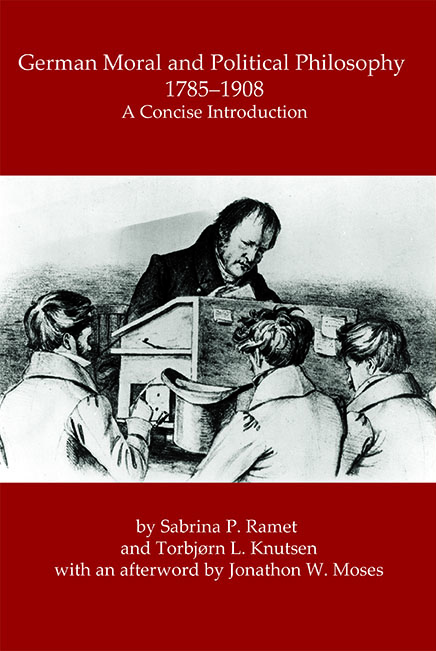
About the Author
Sabrina P. Ramet is a Professor Emerita of Political Science at the Norwegian University of Science & Technology (NTNU) in Trondheim, Norway. Her most recent books are: The Catholic Church in Polish History: from 966 to the present (Palgrave Macmillan, 2017) and Alternatives to Democracy in Twentieth-Century Europe: Collectivist visions of modernity (Central European University Press, 2019).
Torbjørn L. Knutsen is a Professor of Political Science at the Norwegian University of Science & Technology (NTNU) in Trondheim, Norway. His most recent books are: A History of International Relations Theory, 3rd ed. (Manchester University Press, 2016) and Ways of Knowing: Competing methodologies in social and political research, 3rd ed., co-authored with Jonathon W. Moses (Palgrave Macmillan, 2019).
Jonathon W. Moses is a Professor of Political Science at the Norwegian University of Science & Technology (NTNU) in Trondheim, Norway. His most recent books are: Eurobondage: The political costs of monetary union in Europe (ECPR Press, 2017) and Ways of Knowing: Competing methodologies in social and political research, 3rd ed., co-authored with Torbjørn L. Knutsen (Palgrave Macmillan, 2019).
GERMAN MORAL AND POLITICAL PHILOSOPHY, 1785-1908: A concise introduction
Sabrina P. Ramet and Torbjørn L. KnutsenNew Academia Publishing, 2023
228 pages
ISBN 979-8-9852214-6-6 paperback
 See an excerpt from the book.
See an excerpt from the book.
For BULK ORDERS, order directly from New Academia Publishing.
Queries: orders@newacademia.com
About the Author
Sabrina P. Ramet is a Professor Emerita of Political Science at the Norwegian University of Science & Technology (NTNU) in Trondheim, Norway. Her most recent books are: The Catholic Church in Polish History: from 966 to the present (Palgrave Macmillan, 2017) and Alternatives to Democracy in Twentieth-Century Europe: Collectivist visions of modernity (Central European University Press, 2019).
Torbjørn L. Knutsen is a Professor of Political Science at the Norwegian University of Science & Technology (NTNU) in Trondheim, Norway. His most recent books are: A History of International Relations Theory, 3rd ed. (Manchester University Press, 2016) and Ways of Knowing: Competing methodologies in social and political research, 3rd ed., co-authored with Jonathon W. Moses (Palgrave Macmillan, 2019).
Jonathon W. Moses is a Professor of Political Science at the Norwegian University of Science & Technology (NTNU) in Trondheim, Norway. His most recent books are: Eurobondage: The political costs of monetary union in Europe (ECPR Press, 2017) and Ways of Knowing: Competing methodologies in social and political research, 3rd ed., co-authored with Torbjørn L. Knutsen (Palgrave Macmillan, 2019).
GERMAN MORAL AND POLITICAL PHILOSOPHY, 1785-1908: A concise introduction
This book provides an overview of the works of the most influential German moral and political philosophers of the late eighteenth and nineteenth centuries, starting with Immanuel Kant’s Groundwork for a Metaphysic of Morals, published in 1785, and ending with Nietzsche’s Ecce Homo, published posthumously in 1908. Throughout this period, under the impact of the French Revolution and the transformation in political thinking which it effected, the German philosophers examined here confronted, in one way or another, the issue of citizenship and the duties it entailed. This is most explicit in Kant’s Metaphysics of Morals, where the issue of rebellion comes up, and again in Hegel’s Philosophy of Right, where he grounds morality in a social context, writing about people’s duties to family, the community, and the state. In other examples from this book, it may be noted that Max Stirner repudiated the state altogether, thus having no use for any notion of citizenship, while Karl Marx, by interpreting every state as the organ of a particular class, shifted people’s loyalties from the state (citizenship) to their specific class (class consciousness). The main currents represented here are rational idealism, romanticism, anti-Enlightenment reaction, and communism. Two of the chapters look beyond the boundaries of the German lands: the chapter on the Young Hegelians, which places them in the context of continent-wide radical currents; and the chapter on Marx, which takes note of Marx’s interpreters, especially V. I. Lenin and J. V. Stalin. Schleiermacher was one of the two or three most prominent German theologians of the nineteenth century (Adolf von Harnack would also be counted here). But the Stanford Encyclopedia of Philosophy writes that, while “Schleiermacher (1768-1834) perhaps cannot be ranked as one of the very greatest German philosophers of the eighteenth and nineteenth centuries…he is certainly one of the best second-tier philosophers of the period (a period in which the second-tier was still extremely good).”
Praise
“This book delivers just what its title promises: a concise introduction to German philosophy as it developed during the 19th century. The focus is on the most prominent thinkers and the various chapters do a great job of showing how these thinkers addressed some of the issues of their day and, thus, how their ideas are intellectually related. The book is well written and brings both the thinkers and their ideas to life. I enjoyed it immensely and highly recommend it to anyone looking for an introduction to German moral and political philosophy.” —Magnus Rom Jensen, Research Librarian, NTNU





 Coming Soon
Coming Soon Awards
Awards